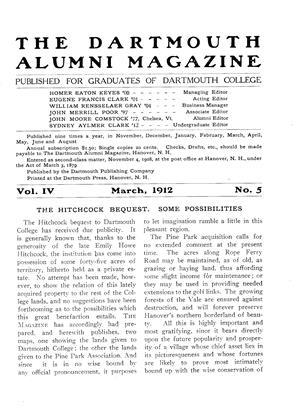Dartmouth mother, Dartmouth dear, As pass thy sons the more appear, A smile we lift through sudden tear, While still, for truth, afar, anear, To hold the fort, to hurl the spear, And glad for onset raise the cheer, Dartmouth is here, Dartmouth is here.
Dartmouth mother, Dartmouth dear, Be it ship of state to steer, Sea-barrier build, a beacon rear, As martyr die or live a seer, Or self-effaced to disappear, Perchance to glorify a bier, Dartmouth is here, Dartmouth is here.
Dartmouth mother, Dartmouth dear, To will, yet Higher Will revere, To know, yet knowing, know no fear, To speak, and yet ere speaking hear, To do, aye doing duty clear, So lead the van, so speed the rear, Dartmouth is here, Dartmouth is here.
The verses which appear above were written by Roger S. Green '59, and are printed with his permission. The circumstances that called them into existence and the evidence of the solidarity of the class of '59 before and after graduation we give in Mr. Green's words:
The class of '59, as if impelled by some presentiment of impending Civil War, formed itself, in its sophomore year, into a uniformed company, called "The Dartmouth Greys," and maintained its organization till graduation. A large silken banner was presented to the company by some young ladies, then pursuing studies at Hanover, and was and is, much prized by us. It served as our class colors in our drills and maneuvers, and is now reposing, carefully shut up in a tin case, in the archives of the College. Our last reunion was oursemi-centennial, in 1909. That called me back to Dartmouth after an absence of 50 years. As many of us as could got together, 12 in all. Most of the absent ones sent letters. We had a good time. One of us dug up our old banner from a mass of accumulation that buried it; we re-mounted it upon a staff and marched through the streets of Hanover, fifeless and drumless indeed, but to the cheers of the onlookers, and with colors as perfect in tissue and tint as on the day we were graduated. We felt like veterans back from the war, to which our class had supplied 21 officers, back, too, from the warfare of life, in which our ranks had been decimated over and over and over again. We had a banquet in College Hall, in a chamber to which we marched with colors flying. It was a remarkable reunion, with the interview in the banquet-hall the chief feature of it. Some of the most eminent of our class had left this world. Others, as distinguished, met with us in that room. The roll was called, letters and telegrams read and each one present gave an account of himself. Class-ties drew and held us close. It was a new and strange experience, in which delight and pathos strove for mastery, — a sacred hour, never to be renewed, save in memory.
Since we met, four more of us, Alden who that day was our color-bearer, Denny, who was then in Austria, Peabody who was with us, and Pickering whom illness detained at home, had passed away. I thought of the passing of the older classes, but at the same time of the growth of the College, continually replenished, its alumni constantly increasing in numbers and in power, their loyalty and ideals not waning but waxing. And while I was thinking, the song in monorhyme, you have seen, took form, the play on the word "Dartmouth" in the first line of each stanza seizing my fancy as it were a copyright-mark for a Dartmouth song.
 View Full Issue
View Full Issue
More From This Issue
-
 Article
ArticleTHE FIRST PROFESSOR IN DARTMOUTH COLLEGE
March 1912 By Richard Wellington Husband -
 Article
ArticleTHE HITCHCOCK BEQUEST. SOME POSSIBILITIES
March 1912 -
 Article
ArticleTHE WINTER CARNIVAL
March 1912 -
 Class Notes
Class NotesLOCAL ASSOCIATIONS
March 1912 -
 Class Notes
Class NotesCLASS OF 1862
March 1912 By CHARLES R. CORNING -
 Class Notes
Class NotesCLASS SECRETARIES
March 1912
Article
-
 Article
ArticlePRESIDENT NICHOLS GUEST OF BRITISH ASSOCIATION
August, 1914 -
 Article
ArticlePatten Resolution
December 1932 -
 Article
ArticleAlumni Dinner Speakers
January 1949 -
 Article
ArticleHanover Browsing
May 1956 By HERBERT F. WEST '22 -
 Article
ArticleHOCKEY PREVIEW
DECEMBER 1969 By JACK DEGANGE -
 Article
ArticleTALES out of SCHOOL
June 1995 By Robert H. Nutt '49

